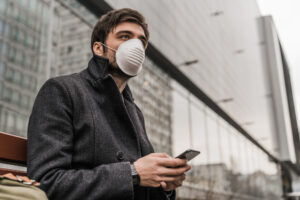
Two thirds of people with mild Covid-19 are still infectious five days after their symptoms begin, according to a study.
The research revealed people spread the virus for longer than previously thought, contrary to NHS guidance which states “many will no longer be infectious to others after five days”.
It comes amid renewed calls for Covid restrictions to be reimposed ahead of winter to help relieve pressure on hospitals which are experiencing the worst waiting times on record.
Tony Blair’s Institute for Global Change urged the government to consider “mandatory mask wearing on public transport and most indoor public venues” to reduce NHS pressures.
And the World Health Organisation told people to “wear a mask and maintain social distancing”, adding: “Learning to live with Covid-19 does not mean pretending it’s not there.” All legal Covid restrictions in the UK, including the requirement to self-isolate, were scrapped in February. The laws were replaced with guidance telling people to “try to stay at home and avoid contact with other people for five days” after they start feeling unwell.
But a study by Imperial College London suggests this five-day period is not long enough to cut transmission. In the first real-world study of its kind, experts monitored 57 people at home after they were exposed to Covid-19 to test how long they remained infectious.
The participants completed questionnaires about their symptoms and had daily tests looking at how much virus they were shedding each day.
Only one in five were infectious before their symptoms developed, but two thirds of cases were still infectious five days after first reporting symptoms.
Professor Ajit Lalvani, the lead author, said: “The NHS currently advises that if you test positive for Covid-19 you should try to stay at home and avoid contact with other people for five days, but our data suggests that under a crude five-day self-isolation period two thirds of cases released into the community would still be infectious — though their level of infectiousness would have substantially reduced.”
He recommended that people isolate for five days and do not leave isolation until they have tested negative twice on lateral flow tests.
Virus cases and hospitalisations are now falling across the UK following a summer surge caused by the emergence of the BA.4 and BA.5 Omicron sub-variants, figures showed yesterday.
Dr Mary Ramsay, of the UK Health Security Agency, said: “It’s encouraging that Covid-19 case rates and hospitalisations are now at low levels. We expect them to remain low over the coming weeks before rising again as we head into the autumn and winter.”
Read more:
Covid infections study increases calls for masks





